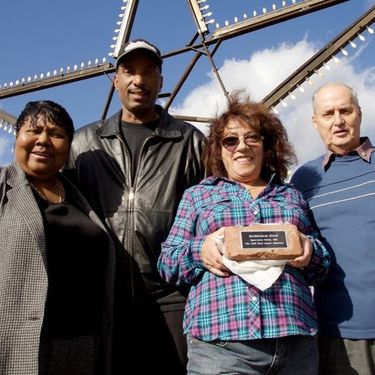
Sessions in which Bilge Kose participates
Monday 6 June, 2016
Sessions in which Bilge Kose attends
Friday 3 June, 2016
Saturday 4 June, 2016
What if we changed our views on heritage? And if heritage has already changed? While, on the global scene, states maintain their leading role in the mobilization of social and territorial histories, on the local scale, regions, neighbourhoods and parishes have changed. Citizens and communities too: they latch on to heritage to express an unprecedented range of belongings that no law seems to be able to take measures to contain, often to the discontent of...
Heritage practices often lead to social exclusion. As an "Authorized Heritage Discourse" (AHD) (Smith 2006) may define what is considered to be heritage, a certain set of social values can come to exclude other values. By formulating heritage policies which reproduce the existing AHD government may further such exclusion. Every now and then AHDs are challenged, leading to what political scientists like Ross (2007; 2009) call "cultural contestations" between groups. These are surrounded ...
The notion of heritage is closely linked to processes of change. In the Western context, the definition of heritage as "a contemporary product shaped from history" (Harvey 2010) highlights the extent to which our relationship with the past is being continually re-configured. However, there is a future dimension implied in this relationship that is often neglected; to paraphrase William Morris, the sense in which heritage testifies to the hopes and aspirations of those now passed away. Making ...
Many people are actively using working class heritage as a resource to reflect on the past and the present, and there is a growing tendency for the heritage of working class people to be interpreted and presented to the public in museums and heritage sites—see for example the Worklab network of museums. Working class communities and organizations also play active roles in creating a memory of their own past, and mobilizing this to sustain political action in the present. Drawing on scho...
In many parts of Europe and North America, but also in Australia, Japan and parts of China, regions of heavy industry, in particular regions of coal and steel industries, have been in decline since the 1960s. In many of these regions, the transition to post-industrial landscapes has provoked discussions surrounding industrial heritage, what to do with it and for which purposes. One of the most ambitious industrial heritage projects was initiated in the Ruhr region of Germany from the 1960s on...
This festive event will offer delegates a taste of one of the iconic dishes of Montreal, the smoked meat sandwich, imported by Jewish immigration from Eastern Europe in the early 20th century. In particular, the tasting will allow a discovery of the products of the renowned international institution Schwartz's, the Hebrew Delicatessen for which Montrealers and tourists alike are willing to wait in long line-ups. During the tasting, “Chez Schwartz,” a documentary produced by Garry B...
Most of what we experience as heritage emerges into conscious recognition through a complex mixture of political and ideological filters, including nationalism. In these processes, through a variety of devices (museums, scholarly research, consumer reproduction, etc.), dualistic classifications articulate a powerful hierarchy of value and significance. In particular, the tangible-intangible pair, given legitimacy by such international bodies as UNESCO, reproduces a selective ordering of cul...
Sunday 5 June, 2016
Canal: Walking the Post-Industrial Lachine Canal (COHDS, 2013 - bilingual) is an audio-walk and booklet that takes listeners from the Atwater Market to the Saint Gabriel Lock, exploring the post-industrial transformation of a once heavily industrialized area. The Lachine Canal area has undergone dramatic changes, as mills and factories were closed and then demolished or converted into high-end condominiums. The adjoining working-class neighbourhoods ...
"What does heritage change?" is a multifaceted question to which the answer(s) are in primary respects related to real-life negotiations among different groups of citizens, cultures, races, ethnic groups, sexual identities, and social classes about received, official and/or widely accepted or accomodated intangible attributes, cultural traditions, historic monuments, buildings, and other transmitted or revived historical legacies. Heritage designated by and for whom, for what motivations, an...
Directed by Tom Fassaert and presented by Marc Jacobs. ___ Doel, a Belgian village near the Dutch border, is disappearing quickly and deliberately. Not because of the four old nuclear reactors on its territory, but because the Flemish government decided that the village might block projects for new docks for the Antwerp harbour, plans developed since the 1960s. In the 21st century this process of officially encouraged depopulation is coming to an end: 2500 inhabitants i...
Monday 6 June, 2016
La Pointe: L’autre bord de la track / The Other Side of the Tracks (COHDS /Public History Students, 2015 - bilingual) takes walkers into a working-class neighbourhood that has undergone massive deindustrialization and is now gentrifying. Pointe-Saint-Charles is also known for its place-based activism and strong neighbourhood identity. Produced by the oral history students in Steven High’s Working Class Public History course, working closely with two other cl...
Recent writing in heritage studies and related disciplines has highlighted the stories and histories of working class people as an overlooked and, at times, marginalized element of the collective heritage imaginary and authorized heritage discourses (Klubock and Fontes 2009; Shackel, Smith and Campbell 2011). The heritage of work has the potential to generate powerful and at times difficult engagements with places where the nature of employment, industry and life have changed as a result of d...
Le patrimoine fait aujourd’hui l’objet d’attentions autant que d’agressions et de destructions. Cela peut s’expliquer par les difficultés de son identification ou de sa conservation. Cela peut plus profondément s’expliquer parce que, dès le départ, il célébre un événement ou conserve une mémoire qui peut être ou devenir une source de dissenssions et de conflits politiques. Enfin, sa reconnaissance suscite des gains économiques pour les uns mais des pertes pour les autres. Mais peut-être...
Directed by William Shewbridge and Michelle Stefano USA; 35 mins Presented by Michelle Stefano ___ After 125 years of operation, the Sparrows Point Steel Mill (Baltimore, Maryland) finally closed its doors in 2012. The film, “Mill Stories”, examines the importance of the mill from the perspectives of former workers and community members while connecting their story to the larger narrative of industrial boom and bust. The film seeks to amplify the voices of forme...
Tuesday 7 June, 2016
(Guided visits to Two Exhibitions, Centre d’histoire de Montréal- bilingual) – The Centre d’histoire de Montréal presents Dans le Griff that takes visitors into the neighbourhood of Griffintown, as depicted through the lives and memories of the Mercier family. Their life stories will take us down the streets of an industrial sector that has undergone quite the metamorphosis. Griffintown is one of the oldest industrial and working-class neighbourhoods in Montreal. In the forefro...
Photography was recognized as an instrument of heritage preservation from the moment of its inception in the early nineteenth century, when projects such as Les Excursions Daguerriennes (1841-1843), a set of Romantic engravings of monuments based on photographic documents, established the links between sight and science, memory and history, hortatory reification and ‘ruin lust’ (Brian Dillon, 2014). This session was conceived in the certain knowledge that almost every speaker at t...
While intangible cultural heritage is an important factor in maintaining cultural diversity in the face of growing globalization, there is still little appreciation of its value. UNESCO endorsed the importance of intangible cultural heritage not only as a cultural manifestation but also, and more importantly, as a wealth of knowledge and skills that are transmitted through generations. We invite paper contributions that address multiple ways of understanding, recognizing, valuing, and p...











